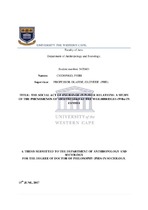| dc.contributor.advisor | Oloyede, Olajide | |
| dc.contributor.author | Phiri, Chidongo | |
| dc.date.accessioned | 2018-08-06T11:22:51Z | |
| dc.date.available | 2018-08-31T22:10:06Z | |
| dc.date.issued | 2017 | |
| dc.identifier.uri | http://hdl.handle.net/11394/6197 | |
| dc.description | Philosophiae Doctor - PhD (Anthropology/Sociology) | |
| dc.description.abstract | This study examined the widely practiced phenomenon of Nichekeleko at the Weighbridges
(WBs) in Zambia. The commonly held understanding of Nichekeleko by the Zambian people
is that; it is corruption, ranging from bribery, theft, embezzlement, money laundering, and
gratification to favouritism. Sociologically, this phenomenon can be referred to as the Social
act of exchange perpetuated in the context of power relations by the actors who engage in the
phenomenon. The study used a local concept to examine the reasons for its persistence. The
focus of the study was based on cultural-specific words implied in Nichekeleko reflecting the
actor"s experiences of doing and thinking about things in a certain way perpetuating the
phenomenon. The subject was approached through an observation of how public discourses
of corruption are reported in a negative sense in print and electronic media ignoring the
localization of the phenomenon. This is because; when a culture linguistic analysis is used at
the WB to examine the reasons for its persistence; it has revealed psychological dimensions
of self-esteem to helping one another by drivers and operators in the form of gifts and other
favours distinct from monetary value. This reflects a Chewa cultural practice for sharing
material gifts and offering moral support to one another. | |
| dc.language.iso | en | |
| dc.publisher | University of the Western Cape | |
| dc.title | The social act of exchange in power relations: A study of Nichekeleko phenomenon at the Weighbridges in Zambia | |
| dc.rights.holder | University of the Western Cape | |

